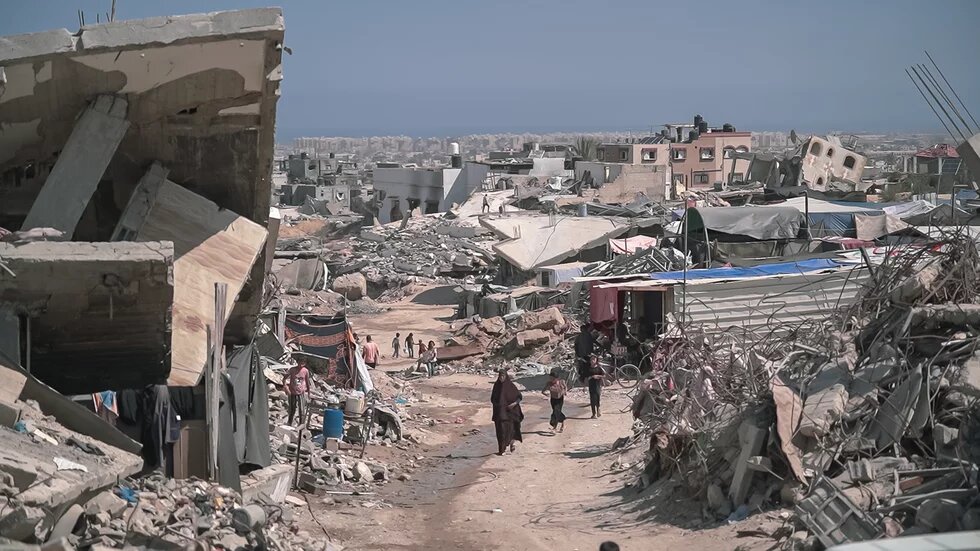In order not to jeopardize a lasting peace solution in the Middle East, the EU must emancipate itself from the USA. International law should be the guiding principle here, writes Simon Ilse, Head of Office in Ramallah.

After 16 months of war and displacement, in which almost 50,000 people have been killed in the Gaza Strip, there is now a threat of further escalation: since the ceasefire between Israel and Hamas came into force in January, the focus of the Israel Defense Forces (IDF) and extremist settlers has shifted to the West Bank. Around 40,000 people have been displaced there in recent weeks, mainly from Jenin, Tulkarm and other places in the north of the territory, which has been occupied in violation of international law since 1967, and their homes have been destroyed by bulldozers.
This is precisely why it is crucial to maintain the ceasefire between Israel and Hamas in the Gaza Strip. This was agreed the day before Donald Trump took office in January. Since then, 33 Israeli hostages have been exchanged for hundreds of Palestinian prisoners in several rounds. The ceasefire was largely observed until the massive Israeli airstrikes this week. The second stage of the agreement, which provides for the release of the 62 hostages still being held by Hamas and the withdrawal of the Israel Defense Force (IDF) from Gaza, was supposed to begin in early March. This would be an essential step towards humanitarian supplies, reconstruction and a lasting peace process.
The EU should insist that international agreements and international law are respected.
To achieve these goals, Europe must quickly reposition itself in light of Trump's departure from the transatlantic partnership. The EU should insist that international agreements and international law are respected. With regard to the conflict in the Middle East, this specifically means taking responsibility:
- Rafah border crossing: the EU must strengthen its role through the European Union Border Assistance Mission (EUBAM).
- Diplomatic autonomy : European policy must not be driven by concepts such as the "Gaza Riviera" or the Abraham Accords, which ignore the Palestinian issue, but must develop its own ideas.
- A unified European position: Or at least a pioneering role for those EU states that want to actively promote a peace solution. Germany has lost a great deal of trust through its unconditional support for Benjamin Netanyahu - both among Palestinians and Arab partners as well as progressive Israelis. It is more important than ever to distinguish between Israel's right to exist and the policies of the Netanyahu government.
Europe must now take a courageous and self-confident stance
Europe now has the opportunity to reposition itself as a credible player in the face of "Trump Gaza" expulsion fantasies. To achieve this, several processes must be initiated simultaneously:
- Joint initiatives with Arab partners: a counter-proposal on the future of Gaza must be developed with Egypt, Jordan and the protecting powers Qatar, Saudi Arabia and the United Arab Emirates. The Arab League's proposal can be built upon.
- Strengthening the role of the UN: Following the US "funding freeze", Europe could give the UN a new role in the region and encourage a common vision for the existing blue helmets of the UN peacekeeping missions.
- Recognition of Palestine by the EU: Spain, Ireland and Norway have led the way. Equal treatment of the right to self-determination for Israelis and Palestinians would be a "game changer" - not necessarily only in the context of a two-state solution.
- Clarification of Palestinian representation: A mechanism and a roadmap for legitimization through elections must be created. This includes the release of Palestinian prisoners by Israel.
- International law as a guiding principle: Germany and Europe must stand up for a world order based on international law which, despite all its imperfections, represents an alternative to the power politics of Trump, Putin and Xi.
- Enforcement of international judgments: The International Court of Justice (ICJ) and the International Criminal Court (ICC) must play a central role. Israel must end its settlement policy in the West Bank by September 2025, as demanded by the UN majority. The arrest warrant against Netanyahu must also be enforced in Germany if he enters the country.
These steps cannot be implemented without conflict either within the EU or in relation to the USA. However, the geopolitical situation is changing rapidly. Europe must now act boldly and confidently - or risk losing further influence in an increasingly competitive world. At best, a ceasefire can be maintained and the first steps in the peace process can be initiated with European participation; at worst, there is a risk of escalation between Trump and Netanyahu with Iran. The latter would be against all of Europe's interests.
This text was first published on March 18, 2025 at Table.Briefings.